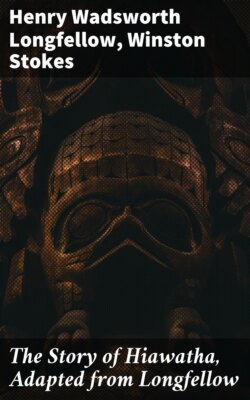Читать книгу The Story of Hiawatha, Adapted from Longfellow - Winston Stokes - Страница 12
На сайте Литреса книга снята с продажи.
HIAWATHA'S CHILDHOOD
ОглавлениеTable of Contents
NO doubt you will wonder what the stories of the Four Winds have to do with Hiawatha, and why he has not been spoken of before; but soon you will see that if you had not read these stories, you could not understand how the life of Hiawatha was different from that of any other Indian. And Hiawatha had been chosen by the great Manito to be the leader of the red men, to share their troubles and to teach them; so of course there were a great many things that took place before he was born that have to be remembered when we think of him.
In the full moon, long ago, the beautiful Nokomis was swinging in a swing of grape-vines and playing with her women, when one of them, who had always wished to do her harm, cut the swing and let Nokomis fall to earth. As she fell, she was so fair and bright that she seemed to be a star flashing downward through the air, and the Indians all cried out: "See, a star is dropping to the meadow!"
There on the meadow, among the blossoms and the grasses, a daughter was born to Nokomis, and she called her daughter Wenonah. And her daughter, who was born beneath the clear moon and the bright stars of heaven, grew into a maiden sweeter than the lilies of the prairie, lovelier than the moonlight and purer than the light of any star.
Wenonah was so beautiful that the West-wind, the mighty West-wind, Mudjekeewis, came and whispered tenderly into her ear until she loved him. But the West-wind did not love Wenonah long. He went away to his kingdom on the mountains, and after he had gone Wenonah had a son whom she named Hiawatha, the child of the West-wind. But Wenonah was so sad because the West-wind had deserted her that she died soon after Hiawatha was born, and the infant Hiawatha, without father or mother, was taken to Nokomis' wigwam, which stood beside a broad and shining lake called "The Big-Sea-Water."
There he lived and was nursed by his grandmother, Nokomis, who sang to him and rocked him in his cradle. When he cried Nokomis would say to him: "Hush, or the naked bear will get thee," and when he awoke in the night she taught him all about the stars, and showed him the spirits that we call the northern lights dance the Death-dance far in the north.
On the summer evenings, little Hiawatha would hear the pine-trees whisper to one another and the water lapping in the lake, and he would see the fire-flies twinkle in the twilight; and when he saw the moon and all the dark spots on it he asked Nokomis what they were, and she told him that a very angry warrior had once seized his grandmother and thrown her up into the sky at midnight, "right up to the moon," said Nokomis, "and that is her body that you see there."
When Hiawatha saw the rainbow, with the sun shining on it, he said: "What is that, Nokomis?" and Nokomis answered, saying: "That is the heaven of the flowers, where all the flowers that fade on the earth blossom once again." And when Hiawatha heard the owls hooting through the night he asked Nokomis: "What are those?" And Nokomis answered: "Those are the owls and the owlets, talking to each other in their native language."
Then Hiawatha learned the language of all the birds of the air, all about their nests, how they learned to fly and where they went in winter; and he learned so much that he could talk to them just as if he were a bird himself. He learned the language of all the beasts of the forest, and they told him all their secrets. The beavers showed him how they built their houses, the squirrels took him to the places where they hid their acorns, and the rabbits told him why they were so timid. Hiawatha talked with all the animals that he met, and he called them "Hiawatha's brothers."
Nokomis had a friend called Iagoo the Boaster, because he told so many stories about great deeds that he had never done, and this Iagoo once made a bow for Hiawatha, and said to him: "Take this bow, and go into the forest hunting. Kill a fine roebuck and bring us back his horns." So Hiawatha went into the forest all alone with his bow and arrows, and because he knew the language of the wild things he could tell what all the birds and animals were saying to him.
"Do not shoot us, Hiawatha!" said the robins; and the squirrels scrambled in fright up the trunks of the trees, coughing and chattering: "Do not shoot us, Hiawatha!" But for once Hiawatha did not care or even hear what the birds and beasts were saying to him.
At last he saw the tracks of the red deer, and he followed them to the river bank, where he hid among the bushes and waited until two antlers rose above the thicket and a fine buck stepped out into the path and snuffed the wind. Hiawatha's heart beat quickly and he rose to one knee and aimed his arrow. "Twang!" went the bowstring, and the buck leaped high into the air and fell down dead, with the arrow in his heart. Hiawatha dragged the buck that he had killed back to the wigwam of Nokomis, and Nokomis and Iagoo were much pleased. From the buck-skin they made a fine cloak for Hiawatha; they hung up the antlers in the wigwam, and invited everybody in the village to a feast of deer's flesh. And the Indians all came and feasted, and called Hiawatha "Strong Heart."
